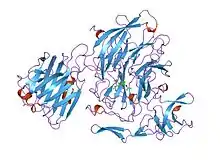| Sialidase, N-terminal domain | |||||||||
|---|---|---|---|---|---|---|---|---|---|
 | |||||||||
| Identifiers | |||||||||
| Symbol | Sialidase | ||||||||
| Pfam | PF02973 | ||||||||
| InterPro | IPR004124 | ||||||||
| SCOP2 | 1sli / SCOPe / SUPFAM | ||||||||
| CAZy | GH33 | ||||||||
| |||||||||
In molecular biology, glycoside hydrolase family 33 is a family of glycoside hydrolases.
Glycoside hydrolases EC 3.2.1. are a widespread group of enzymes that hydrolyse the glycosidic bond between two or more carbohydrates, or between a carbohydrate and a non-carbohydrate moiety. A classification system for glycoside hydrolases, based on sequence similarity, has led to the definition of >100 different families.[1][2][3] This classification is available on the CAZy web site,[4][5] and also discussed at CAZypedia, an online encyclopedia of carbohydrate active enzymes.[6][7]
This family contains sialidases (CAZY GH_33), which hydrolyse alpha-(2->3)-, alpha-(2->6)-, alpha-(2->8)-glycosidic linkages of terminal sialic residues in oligosaccharides, glycoproteins, glycolipids, colominic acid and synthetic substrates. Sialidases may act as pathogenic factors in microbial infections.[8] The 1.8 A structure of trans-sialidase from leech (Macrobdella decora, Q27701) in complex with 2-deoxy-2, 3-didehydro-NeuAc was solved. The refined model comprising residues 81-769 has a catalytic beta-propeller domain, a N-terminal lectin-like domain and an irregular beta-stranded domain inserted into the catalytic domain.[9]
References
- ↑ Henrissat B, Callebaut I, Fabrega S, Lehn P, Mornon JP, Davies G (July 1995). "Conserved catalytic machinery and the prediction of a common fold for several families of glycosyl hydrolases". Proceedings of the National Academy of Sciences of the United States of America. 92 (15): 7090–4. Bibcode:1995PNAS...92.7090H. doi:10.1073/pnas.92.15.7090. PMC 41477. PMID 7624375.
- ↑ Davies G, Henrissat B (September 1995). "Structures and mechanisms of glycosyl hydrolases". Structure. 3 (9): 853–9. doi:10.1016/S0969-2126(01)00220-9. PMID 8535779.
- ↑ Henrissat B, Bairoch A (June 1996). "Updating the sequence-based classification of glycosyl hydrolases". The Biochemical Journal. 316 (Pt 2): 695–6. doi:10.1042/bj3160695. PMC 1217404. PMID 8687420.
- ↑ "Home". CAZy.org. Retrieved 2018-03-06.
- ↑ Lombard V, Golaconda Ramulu H, Drula E, Coutinho PM, Henrissat B (January 2014). "The carbohydrate-active enzymes database (CAZy) in 2013". Nucleic Acids Research. 42 (Database issue): D490-5. doi:10.1093/nar/gkt1178. PMC 3965031. PMID 24270786.
- ↑ "Glycoside Hydrolase Family 33". CAZypedia.org. Retrieved 2018-03-06.
- ↑ CAZypedia Consortium (December 2018). "Ten years of CAZypedia: a living encyclopedia of carbohydrate-active enzymes" (PDF). Glycobiology. 28 (1): 3–8. doi:10.1093/glycob/cwx089. PMID 29040563.
- ↑ Rothe B, Rothe B, Roggentin P, Schauer R (April 1991). "The sialidase gene from Clostridium septicum: cloning, sequencing, expression in Escherichia coli and identification of conserved sequences in sialidases and other proteins". Molecular & General Genetics. 226 (1–2): 190–7. doi:10.1007/BF00273603. PMID 2034213. S2CID 21308462.
- ↑ Luo Y, Li SC, Chou MY, Li YT, Luo M (April 1998). "The crystal structure of an intramolecular trans-sialidase with a NeuAc alpha2-->3Gal specificity". Structure. 6 (4): 521–30. doi:10.1016/S0969-2126(98)00053-7. PMID 9562562.